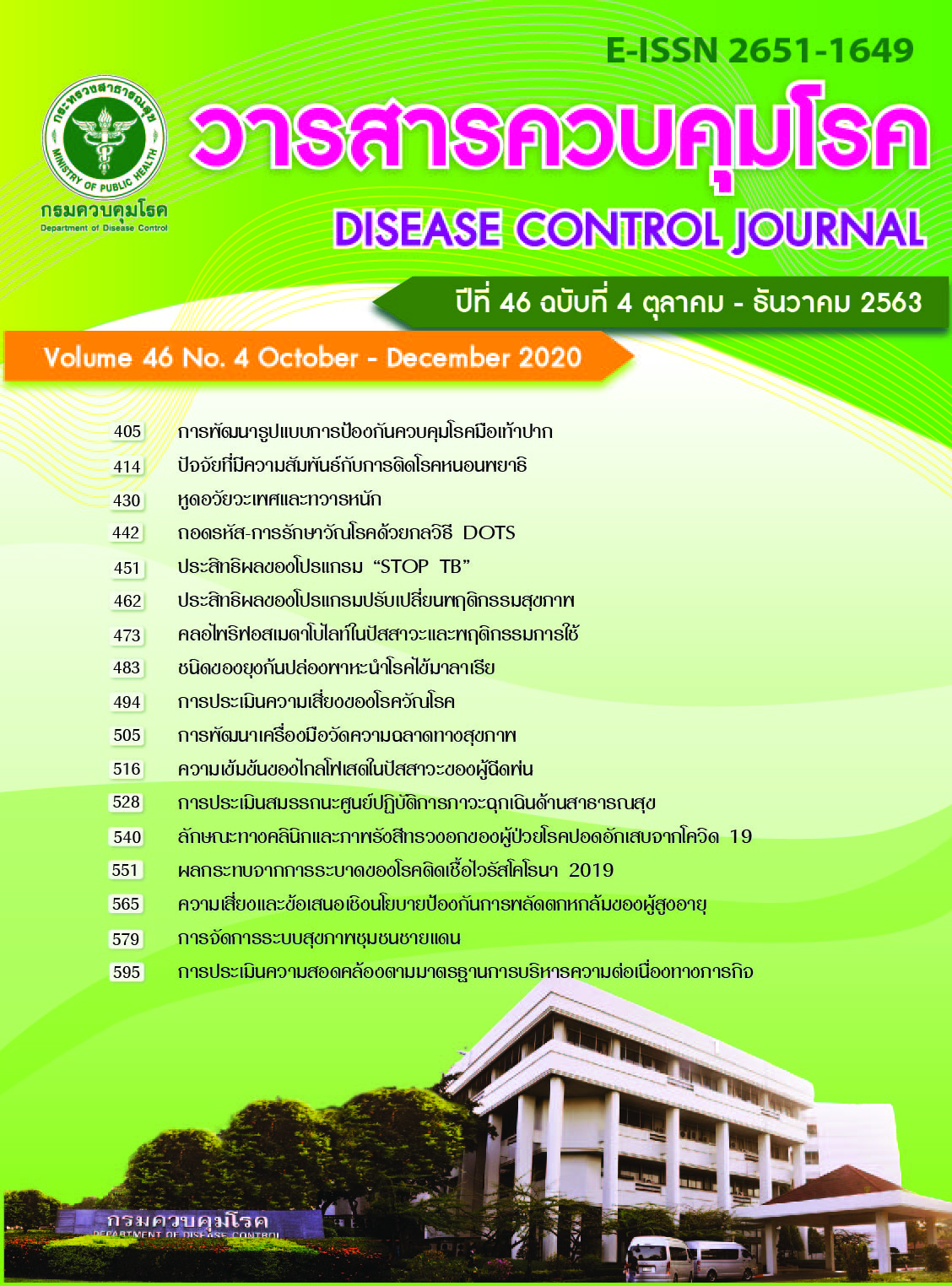Analysis of BMA-DOTS in the treatment of tuberculosis in Bangkok
DOI:
https://doi.org/10.14456/dcj.2020.41Keywords:
tuberculosis, DOTS, BMA-DOTSAbstract
Tuberculosis has been a major global public health problem since the ancient time until now-a-days. Thailand is listed 1 of the 14 high TB burden countries in the world. Bangkok, the capital of Thailand is epidemiologically expected bearing heavy TB burden. The Bangkok Metropolitan Administration (BMA) launched a WHO recommended Directly Observed Treatment-Short course (DOTS) project in the treatment of TB as his TB control strategy since 1998. This BMA-DOTS be managed to serve TB patients on free of charge, convenient and strictly monitored bases. Admits with high concern, sympathy and love atmosphere in taking care TB patients and good achievement of treatment outcome were reported. According to the Bangkok TB Annual Report 2017, the average 4 years (2013-2016) treatment results compared to that of the other medical service institutions in Bangkok which run self-administered-treatment (SAT) is obviously outstanding. In conclusion, BMA-DOTS achieved WHO recommended treatment target ≥90% at around 95% outcome consecutively for many years, while default and refer-out rates were the least. BMA-DOTS assures that DOTS is possible and valuable treatment measure. When run under efficient managing system, it would be excellent. It is recommended that this BMA-DOTS should be properly applied to the other medical institutions.
Downloads
References
Bureau of Tuberculosis. National tuberculosis control programme guideline, Thailand, 2018. Nonthaburi: Department of Disease Control (TH); 2018. (in Thai)
Nakajima H. Tuberculosis: a global emergency. World Health. 1993;46(4):3.
Bangkok Metropolitan Administration. Appointing a planning and developing committees for efficient tuberculosis control in Bangkok, 1997 February 13, Bangkok: Bureau of Bangkok Metropolitan Administration; 1997. Official Document No.: 624/1997. (in Thai)
Garner P, Volmink J. Directly observed treatment for tuberculosis. BMJ. 2003;327(7419):823-4.
World Health Organization. The global plan to stop TB 2006-2015. Geneva: World Health Organization; 2006.
World Health Organization. Global tuberculosis report 2019. Geneva: World Health Organization; 2019.
World Health Organization. Implementing the end TB strategy: the essentials. Geneva: World Health Organization; 2015.
O’Boyle SJ, Power JJ, Ibrahim MY, Watson JP. Factors affecting patient compliance with anti-tuberculosis chemotherapy using the directly observed treatment, short-course strategy (DOTS). Int J Tuberc Lung Dis. 2002;6(4):307-12.
Chunhaswasdikul B, Kamolratanakul P, Jittinandana A, Tangcharoensathien V, Kuptawintu S, Pantumabamrung P. Anti-tuberculosis programs in Thailand: a cost analysis. Southeast Asian J Trop Med Public Health. 1992;23(2):195-9.
Kamolratanakul P, Chunhaswasdikul B, Jittinandana A, Tangcharoensathien V, Udomrati N, Akksilp S. Cost-effectiveness analysis of three short-course anti-tuberculosis programmes compared with a standard regimen in Thailand. J Clin Epidemiol. 1993;46(7):631-6.
Al-Hajjaj MS, Al-Khatim IM. High rate of non-compliance with anti-tuberculosis treatment despite a retrieval system: a call for implementation of directly observed therapy in Saudi Arabia. Int J Tuberc Lung Dis. 2000;4(4):345-9.
Murray CJ, DeJonghe E, Chum HJ, Nyangulu DS, Salomao A, Styblo K. Cost effectiveness of chemotherapy for pulmonary tuberculosis in three sub-Sahara African countries. Lancet. 1991;338(8778):1305-8.
Okanurak K, Kitayaporn D, Fungladda W. Factors associating with completion and default rates for treatment of tuberculosis patients in Bangkok. Bangkok: Mahidol University, Faculty of Tropical Medicine; 2006. (in Thai)
Department of Health. Policy and guideline in TB control in Bangkok. Bangkok: Bangkok Metropolitan Administration; 2011. (in Thai)
Department of Health. Bangkok TB annual report 2017. Bangkok: Bangkok Metropolitan Administration; 2017. (in Thai)
Downloads
Published
How to Cite
Issue
Section
License
Articles published in the Disease Control Journal are considered as academic work, research or analysis of the personal opinion of the authors, not the opinion of the Thailand Department of Disease Control or editorial team. The authors must be responsible for their articles.






